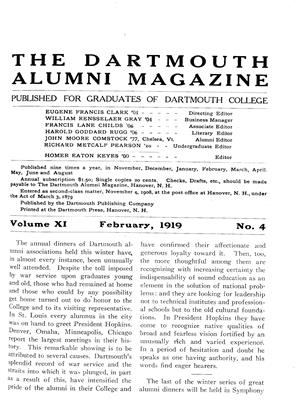Now that the short-lived S. A. T. C. has passed into history, it becomes a comparatively easy matter to sit back and view its influence from a broadly impartial standpoint. With the military regime dead and buried, its unfavorable aspects forgotten, Dartmouth undergraduates as a body look back upon their three months of army life as but one of the many episodes that go to make up a four years' college career. The period of military training stands out as a valuable experience, but one that can be better appreciated after its close.
Dartmouth men welcomed the opporunity of enlistment offered by the formation of the S. A. T. C. in October. They saw in it a direct path to higher officers' training camps and an effective means of rendering the service most needed at the time. But, when the signing of the armistice brought with it almost immediate demobilization throughout the country, the desire for normal conditions naturally worked its way into the undergraduate mind. Dartmouth students would willingly assist in any overturning of the regular college routine that might be of service as a war measure; but, peace once assured, they would go nearly as far to the other extreme in order to bring back the Dartmouth of former years.
Many beneficial effects of the S. A. T. C. will undoubtedly creep to the surface as time goes on. Some have already made their appearance. To a certain extent military training infused into the college, habits of order and attention to scholastic work that cannot pass away in a few months' time. More than anything else, it awoke among the undergraduates an appreciation of the normal Dartmouth never before realized. The formation of the S. A. T. C. branch in Hanover was a timely move. Its discontinuance at exactly the proper time ranks in the student mind as an equally opportune step.
 View Full Issue
View Full Issue
More From This Issue
-
 Article
ArticleMILITARY NEWS
February 1919 -
 Article
ArticleTHE STUDENTS' ARMY TRAINING CORPS OF 1918
February 1919 By Edwin J. Bartlett '72 -
 Article
ArticleThe annual dinners of Dartmouth
February 1919 -
 Article
ArticleDARTMOUTH ROLL OF HONOR
February 1919 -
 Article
ArticleDARTMOUTH REUNION IN PARIS
February 1919 -
 Class Notes
Class NotesCLASS OF 1916
February 1919 By Richard Parkhurst







